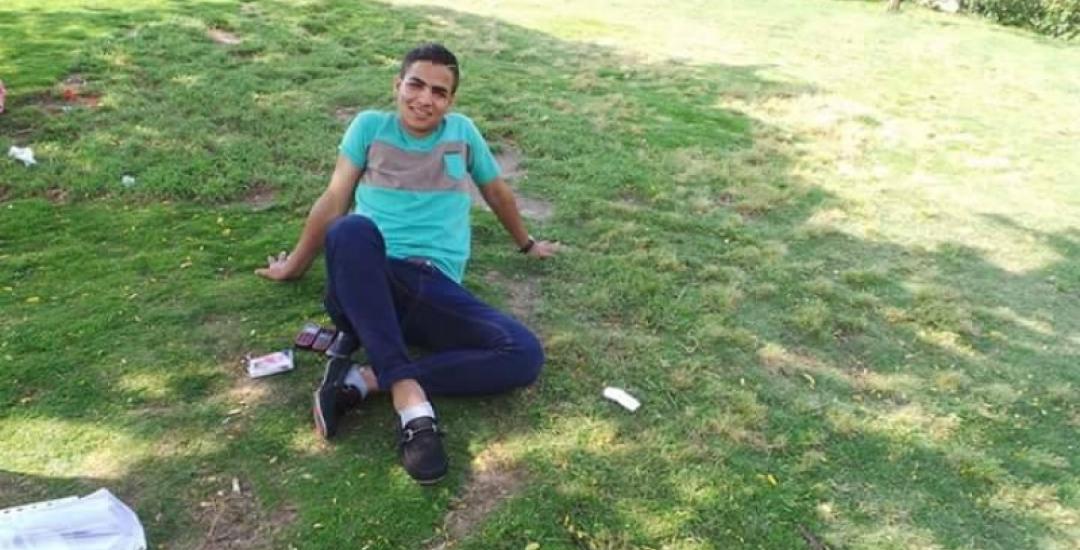
On 17 November 2015, 18-year-old student Moaz Eid Abdelazim Ismael was sentenced to two years in prison for "demonstrating without authorisation," following a flawed trial. Arrested by members of the Security Forces in early July, Moaz was secretly detained for a week during which he was repeatedly tortured. Currently awaiting a new hearing before the public prosecution in the police station where he was tortured, Moaz remains at high risk of being ill-treated again. Fearing for his physical and mental integrity and in view of the risk that their son be sentenced in a new and unfair trial, they contacted Alkarama who, on 26 November 2015, sent an urgent appeal to the United Nations Working Group on Arbitrary Detention (WGAD) to ask the Egyptian authorities to release him immediately and drop all charges against.
Arrest, incommunicado detention and torture
Moaz was arrested by members of the Security Forces dressed in civilian clothes as he was leaving his family house in Doobar − a village near the city of Faiyum, a 100km south of Cairo − on 1 July 2015. Brought to Ibshway police station, he was detained incommunicado for a week during which he was repeatedly electrocuted and beaten up because of his affiliation to the Muslim Brotherhood, a political group declared a terrorist organisation by the Egyptian authorities on 25 December 2013. Still unable to contact his family or even a lawyer, on 8 July 2015 Moaz was brought before the Public Prosecution and charged with "belonging to an outlawed group" and "having assaulted a security officer in Mecca Hospital." Complaints of torture made by his lawyer were ignored by the prosecutor.
Back at the police station, Moaz was eventually allowed to see his family − but not a doctor − and on 27 July, the public prosecution authorised his release on bail. The police officers, however, did not comply with the court order and Moaz was illegally kept in detention. On 8 August, the 18-year-old reappeared before the public prosecution, which charged him with new accusations of "belonging to an outlawed group" and "having demonstrated without authorisation," under the restrictive law n°107 of 2013 on "Organization of the Right to Public Assembly, Processions and Peaceful Demonstrations in Public Places." During his trial on 1 September 2015, the Faiyum Court released him without charges, but Moaz was again illegally kept in detention at Ibshway police station. Held again incommunicado, it is only on 20 September that he was able to see his lawyer, when he was brought for a third time to the public prosecution to be charged with "demonstration without authorisation."
Sentenced to two years in prison
On 17 November 2015, he was sentenced to two years in prison under these accusations on the sole basis of evidence brought forward by the Homeland Security, evidence that his lawyer did not have sufficient time to examine. Since then, Moaz remains detained in Ibshway police station as he awaits a new hearing before the public prosecution and another trial. Due to the poor conditions of detention there, his health continues to deteriorate and he remains at high risk of torture in reprisal for his political affiliations.
"Moaz' case is symptomatic of a country where the judiciary is guided by political motives and where justice does not have the same meaning for all citizens," declared Rachid Mesli, Legal Director at Alkarama. "Both the facts that he was sentenced following several procedural irregularities and an arbitrary detention, and that no measures were taken to punish the individuals who tortured him, demonstrate that Egypt's judiciary lacks independence and impartiality and that impunity prevails for violations of human rights law."
Left without any effective local remedies to solve their son's situation, Moaz' parents turned to Alkarama, which requested the United Nations Working Group on Arbitrary Detention (WGAD) to call upon the Egyptian authorities to immediately end the procedure against Moaz Eid Abdulazim Ismael and to release him. The authorities should ensure that its judicial system is independent and impartial and end the detention of the thousands of individuals detained because of their alleged political affiliations.
For more information or an interview, please contact the media team at media@alkarama.org (Dir: +41 22 734 1008)
